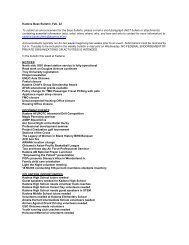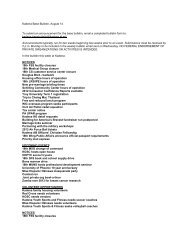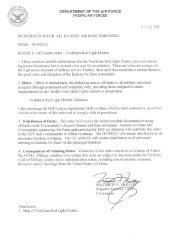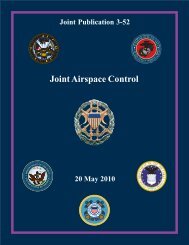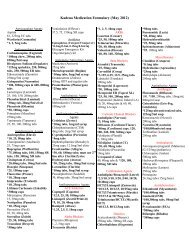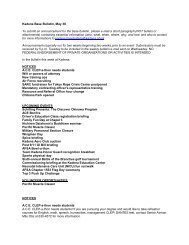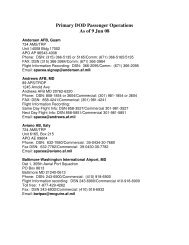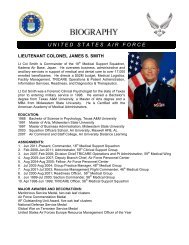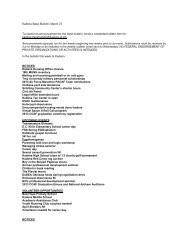Sleep Hygiene Guidelines
Sleep Hygiene Guidelines
Sleep Hygiene Guidelines
You also want an ePaper? Increase the reach of your titles
YUMPU automatically turns print PDFs into web optimized ePapers that Google loves.
Bedroom Environment: Moderate Temperature, Quiet, and Dark<br />
Extremes of heat or cold can disrupt sleep. A quiet environment is more sleep promoting than a<br />
noisy one. Noises can be masked with background white noise (such as the noise of a fan) or with<br />
earplugs. Bedrooms may be darkened with black-out shades or sleep masks can be worn. Position<br />
clocks out-of-sight since clock-watching can increase worry about the effects of lack of sleep. Be sure<br />
your mattress is not too soft or too firm and that your pillow is the right height and firmness.<br />
Eating<br />
A light bedtime snack, such a glass of warm milk, cheese, or a bowl of cereal can promote sleep.<br />
You should avoid the following foods at bedtime: any caffeinated foods (e.g., chocolate), peanuts,<br />
beans, most raw fruits and vegetables (since they may cause gas), and high-fat foods such as potato<br />
chips or corn chips. Avoid snacks in the middle of the nights since awakening may become associated<br />
with hunger.<br />
If you have trouble with regurgitation, be especially careful to avid heavy meals and spices in the<br />
evening. Do not go to bed too hungry or too full. It may help to elevate you head with some pillows.<br />
Avoid Naps<br />
Avoid naps, the sleep you obtain during the day takes away from you sleep need that night resulting<br />
in lighter, more restless sleep, difficulty falling asleep or early morning awakening. If you must nap,<br />
keep it brief, and take the nap about 8 hours after arising. It is best to set an alarm to ensure you don’t<br />
sleep more than 10-15 minutes.<br />
Limit Your Time in Bed<br />
Restrict your sleep period to the average number of hours you have actually slept per night during<br />
the preceding week. Quality of sleep is important. Too much time in bed can decrease the quality on<br />
subsequent night and contribute to the maintenance of existing sleep problems. Don’t lay in bed for<br />
extended times not sleep. If you aren’t asleep in about 15-20 minutes go ahead and get up. Do<br />
something outside the bedroom that is relaxing. When you feel sleepy (i.e., yawning, head bobbing,<br />
eyes closing, concentration decreasing, then return to bed. Don’t confuse tiredness with sleepiness, they<br />
are different. Tiredness doesn’t lead to sleep, only sleepiness does.<br />
Regular <strong>Sleep</strong> Schedule<br />
Keep a regular time each day, 7 days a week, to get out of bed. Keeping a regular awaking time<br />
helps set your circadian rhythm set so that your body learns to sleep at the desired time.<br />
Use the attached form to develop a plan for improving you sleep<br />
hygiene. It will take time for you sleep to get back in line so once you begin<br />
your sleep hygiene plan, stick with if for at least 6-8 weeks.



